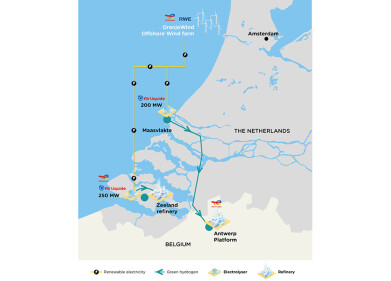Green energy
Hydrogen fired burners for ‘green’ glassmaking
Oct 05 2021
Author credit: Stephen B. Harrison and Allegra Cresswell-Turner, sbh4 consulting
The glass manufacturing industry is incredibly energy-intensive. This is mainly due to the high heat requirement during processes such as glass melting. Over 70% of this energy is currently being supplied by fossil fuels, such as natural gas, which release post-combustion carbon dioxide (CO2) emissions. Furthermore, during the melting process of raw materials during glassmaking, process-geogenic CO2 emissions are also being released.
To drastically reduce these greenhouse gas emissions and achieve international climate protection goals, ‘green’ hydrogen has come into the conversation. By using hydrogen produced from renewable energy, the proportion of emissions attributed to glassmaking would be significantly reduced. It is important to note that during the process of glassmaking, the release of geogenic CO2 is unavoidable, which is why part of the decarbonisation solution in glass production and other mineral processing industries must therefore include ‘carbon capture’ in addition to decarbonisation of the energy input.
Overcoming concerns about hydrogen in the glass production industry
Traditionally, it has been considered that pure hydrogen is not suitable glass melting. This is due to its pale flame not being able to penetrate heat into the glass liquid well, leaving the top layer too hot and the bottom of the pool too cold. It has always been assumed that the glass kiln requires a ‘sooty’ flame to work due to the soot enhancing the radiant heat transfer.
Teams of combustion engineers have been working for decades to make the blended hydrogen and natural gas flames increasingly sooty by intentionally slowing down mixing of natural gas and oxygen to make soot in the flame. However, the increasing interest on the topic of using pure hydrogen in glassmaking has led to a growing number of research projects in the field, which are challenging previous concerns around the use of pure hydrogen within the glassmaking industry.
Switching to ‘green’ fuel in Germany
In developed nations, industry may account for roughly 25% of total greenhouse gas (GHG) emissions. To meet net zero targets in the glass sector, electrification of heating is an option. Alternatively, adding hydrogen to natural gas to produce fuel for the furnaces is an economically plausible alternative, which could be implemented imminently.
The Federal Association of the German Glass Industry (BV Glas) is investigating how green hydrogen can be used as fuel in glass manufacturing through its Hyglass project in Essen. This project is in collaboration with the Gas and Heating Institute (GWI) and is laying the foundations for using hydrogen in industrial plants. Glass will always be an important raw material and by replacing natural gas with hydrogen in the melting process, a reduction of CO2emissions of around 3.3 million tonnes per year could be achieved across Germany.
Hydrogen-fired sheet glass in the Liverpool City Region
In the UK, trials have begun at Pilkington’s St Helen’s facility in Liverpool City Region to produce float (sheet) glass using burners fired with 100% hydrogen. Progressive Energy’s HyNet Industrial Fuel Switching project is just one of the several projects underway in North West England. The Pilkington UK trial could revolutionise glass making.
Additionally, another HyNet trial is planned for Unilever later this year in Port Sunlight. Future proofing industry with decarbonization will secure 340,000 manufacturing jobs in the region and bring investment through innovation and technological leadership.
The HyNet Industrial Fuel Switching programme has been granted funding of £5.3 million from the UK Government and its projects will support decarbonisation in the North West industrial cluster, with impact from 2025. It has been estimated that up to ten million tonnes of CO2 emissions could be eliminated from across North West England and North West Wales each year.
Events
Apr 08 2025 Targi Kielce, Poland
Apr 08 2025 Bahrain
Apr 10 2025 Beijing, China
Apr 10 2025 Beijing, China
Apr 15 2025 Moscow, Russia

















